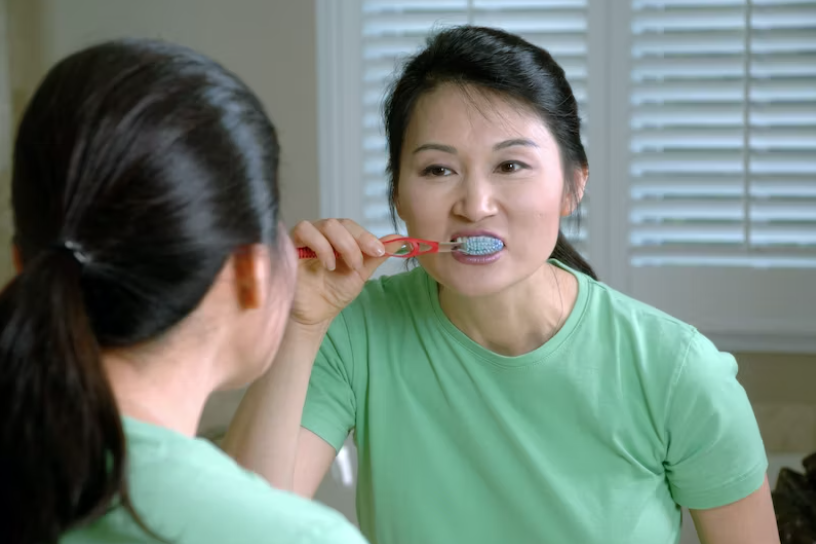Healthy gums rarely bleed, regardless of orthodontic treatment, so it is vitally important that before you have braces fitted, your orthodontist provides a thorough check of your oral health. If your orthodontist finds that your teeth and gums need some work before orthodontic treatment it could be that you need to undergo preventative treatment of gum disease, other times scaling, or root planning may be necessary to ensure your mouth is in optimal condition before treatment begins.
Your expert orthodontist in Darwen has put together this guide to help if you are worried about your dental health before having braces fitted. Keep reading to find out why gums sometimes bleed and what you can do as a preventive measure to ensure your teeth and gums stay as healthy as possible.
Possible Causes of Bleeding Gums Whilst Wearing Braces
Many possible causes of bleeding can relate to wearers and non-wearers of braces. These include:
- Improper Oral Hygiene – inadequate brushing and flossing can lead to the accumulation of plaque and bacteria around your braces, causing inflammation and bleeding.
- Tartar Build-Up – by not following a regular and proper oral hygiene routine, there is a risk of tartar and bacteria building up between your teeth. This can cause gum inflammation and bleeding.
- Gingivitis – if left untreated, poor oral hygiene can progress to gingivitis, an early stage of gum disease characterised by swollen and bleeding gums.
- Hormonal Changes – during adolescence and later in life, when our hormones change, gingival inflammation can occur causing a multiplication of bacteria around the gum.
- Brace Adjustments – after getting your braces tightened or adjusted, it’s not uncommon for your gums to become sensitive and bleed.
How to Maintain Optimal Oral Hygiene and Prevent Bleeding Gums
By perfecting your dental hygiene routine, you can rest assured that bleeding will not be an issue, so our team at your expert orthodontist in Darwen have pulled together this list which we think will help toward optimal oral hygiene:
- Brushing – use a soft-bristle toothbrush and be gentle but thorough. Make sure to brush not only the teeth but also around the brackets and wires.
- Flossing – this can be challenging, but incredibly important. Invest in floss threaders or interdental brushes to clean between the wires and brackets effectively.
- Mouthwash – rinse with an antiseptic or fluoride mouthwash to help reduce bacteria and promote gum health.
- After meals and snacks – ensure that you brush and/ or floss after eating, to make sure that any food debris is cleared as soon as possible.
- Orthodontic Wax – if you notice any sharp edges or wires irritating, applying orthodontic wax can help create a barrier between the braces and your gums, preventing further irritation and bleeding.
- Regular Check-ups – schedule routine dental appointments to monitor the health of your gums and address any concerns promptly. Your orthodontist can make necessary adjustments to your braces and guide proper care.
- Gentle Gum Massage – gently massaging your gums with a soft toothbrush or your finger can help stimulate blood circulation and reduce inflammation.
- Adapt Your Diet – steer clear of sticky, hard, or overly crunchy foods that can exacerbate gum irritation. Instead, opt for a braces-friendly diet to minimise the risk of additional discomfort.
- Stay Hydrated – drinking an adequate amount of water helps flush out bacteria and promotes overall oral health. It also helps maintain saliva production, which plays a crucial role in preventing plaque build-up.
What to do if Your Gums Start Bleeding During Treatment?
First and foremost, it is important for you to contact your orthodontist and for them to carry out a full inspection of your teeth, gums, and braces to see why the issue may be occurring. It could be as simple as a wire poking out into your gums and causing irritation, or a loose bracket. However, without proper inspection, it is difficult to rule out if anything more serious is at play.
If the bleeding is being caused by poor oral hygiene and a build-up of tartar and calculus around the teeth, then a mouth cleaning by your orthodontist every 3 to 4 weeks should keep this issue at bay.
Serious Cases of Bleeding Gums During Braces Treatment
There are rare cases of continuous bleeding where treatment must be stopped, this can be due to several things. Cases of gingival inflammation and an extremely high presence of bacteria in the mouth can mean that a very specific dental treatment must be performed to prevent gum recession and bone loss. Once your orthodontist is happy that the level of bacteria has reduced, then treatment can resume.
There are also cases where, specifically in adolescents, the gums grow around the brackets and prevent the correct placement of the archwire and rubber bands. Appliances must again be removed in these cases, the correct procedure performed and then treatment continued.
If You’re Concerned About Oral Hygiene, Speak to a Specialist Orthodontist in Darwen
Our team at Darwen Orthodontics offers a wide range of the latest orthodontic treatments, helping children and adults gain beautiful smiles. We are expert orthodontists in Darwen with an extensive background in fitting and maintaining braces, to ensure our customers not only get the smile of their dreams at the end of treatment but also ensure that their oral health remains intact.
If you would like more information or to book an appointment with our specialist orthodontist in Darwen, we will be only too happy to discuss treatment options with you. Contact us today and book your free consultation.


